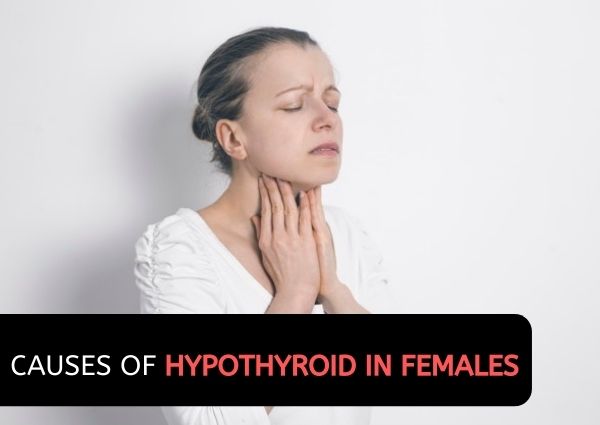CAUSES OF HYPOTHYROID IN FEMALES
Thyroid is a small, butterfly-shaped gland situated at the base of the front of our neck, just under Adam’s apple. It produces two hormones chiefly – Triiodothyronine (commonly known as T3) and Thyroxin (commonly known as T4. These hormones have a major role in controlling growth and development of our body, regularise our metabolism and other body functions. These hormones also control body temperature and heart rate.
Thyroid gland tends to alter the production of hormones according to bodies requirement. This is controlled by another hormone called Thyroid stimulating hormone (TSH) which is secreted by Pituitary gland.
When thyroid gland becomes overactive due to some reasons, it tends to secrete more of T3 & T4.this condition is known as Hyperthyroidism. On the contrary when its activity is low, lesser T3 & T4 are secreted and this condition is known as Hypothyroidism.
Both conditions Hyperthyroid and Hypothyroid causes impaired body metabolism, affect heart rate, growth and fertility also.
Diagnosis of thyroid is done by checking THYROID FUNCTION TEST (T3, T4, TSH) in blood and according to reports its treatment is given.
HYPOTHYROIDISM
Underactive Thyroid is a condition during which thyroid gland doesn’t produce enough of T3 & T4 hormones.
Hypothyroidism might not cause noticeable symptoms in the early stages. But it lowers the metabolism of body and hence over time, untreated hypothyroidism can cause variety of health problems, like obesity, joint pain, irregular menstrual cycles, infertility and cardiovascular disease.
But if timely diagnosed and treated early it can be kept under control. A close watch on Thyroid functions is recommended. It is advised to get a periodic check through blood test and adjustment of doses accordingly.
CAUSES
When thyroid gland doesn’t produce enough hormones, the chemical reactions occurring in our body gets disturbed. There can be variety of causes, including autoimmune disease, hyperthyroidism treatments, radiation therapy, thyroid surgery and certain medications.
Autoimmune disease
One of the most common reasons for hypothyroidism is an autoimmune disorder referred to as Hashimoto’s thyroiditis. Autoimmune disorders can occur when your immune system produces antibodies that attack your own tissues.
Though actual reason not known, but it’s likely a mix of factors, like your genes and an environmental trigger. However it happens, these antibodies affect the thyroid’s ability to produce hormones.
Over-response to hyperthyroidism treatment
Lose Weight
Individuals who produce an excessive amount of thyroid hormone (hyperthyroidism) are often treated with radioactive iodine or anti-thyroid medications, Keeping in mind to lower the thyroid activity otherwise increased. But in rare cases it reduces production of thyroid hormones to the extent that now condition is converted from hyper active gland to less active gland i.e. hyperthyroidism to hypothyroidism.
Thyroid surgery
Removing all or a huge portion of thyroid gland can diminish or halt hormone production. In such a case, you will need to take thyroid hormone for life.
Radiation therapy
In patients suffering from Head & neck carcinoma, radio therapy given as a part of treatment may sometimes affect thyroid gland making it hypoactive
Medications
A variety of medications can contribute to hypothyroidism. Lithium is one such medication, that is used to treat certain psychiatric disorders. If you are taking medication, you need to ask your doctor about its effect on your thyroid gland.
Rarely though, hypothyroidism may result from one of the following:
Congenital disease
In some infants there is no thyroid gland by birth or thyroid gland does not develop properly and hence is not functioning normal. It is difficult to identify such infants by physical examination only. This is the reason, most of the states have made it mandatory to screen every new born for thyroid
Pituitary disorder
As stated earlier, thyroid gland is regulated by Pituitary gland through a hormone TSH. In very rare condition, pituitary fails to produce enough of TSH sufficient to control Thyroid gland, hence reducing its normal activity, resulting in Hypothyroidism. Generally it happens when there is a tumour development in Pituitary.
Pregnancy
Some women develop hypothyroidism during or after pregnancy (postpartum hypothyroidism), usually because they produce antibodies to their own thyroid gland. If it is not treated on time it may cause significant increase in blood pressure of mother which is dangerous for foetus. Such hypothyroidism (postpartum) may result in abortion or premature delivery also.
Iodine deficiency
The trace mineral iodine — found primarily in seafood, seaweed, plants grown in iodine-rich soil and iodized salt — is crucial for the production of thyroid hormones. Insufficient iodine can result in hypothyroidism, and an excessive amount of iodine can worsen hypothyroidism in individuals who already have the condition. In some parts of the globe, iodine deficiency is common, but the addition of iodine to table salt has virtually eliminated this problem in some parts of the world.

